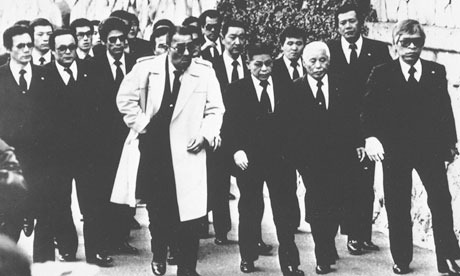Elliott Hall's Blog, page 4
February 7, 2012
Reality makes an appearance on Wall Street
An article in New York Magazine about soul-searching on Wall Street is worth reading for more than just cheap laughs at the emo traders' expense.
To comply with the looming regulations, banks have begun stripping themselves of the pistons that powered their profits: leverage and proprietary trading. In the wake of the crash, Morgan Stanley and Goldman Sachs converted to bank holding companies to tap the "discount window," the Fed's pipeline of cheap funds that gave the banks an emergency source of liquidity. That move seemed smart then, but the stricter standards required of banks have now left them boxed in.
The combination of nearly free money from the Fed and proprietary trading has allowed the very institutions most implicated in the crash to continue gambling with government money. If this is true it can't come soon enough.
January 9, 2012
January 6, 2012
The Devil you know
The Guardian has an interesting story about Japan's attempt to curb the Yakuza:
Tokyo recently became the last of Japan's 47 prefectures to introduce local laws aimed at depriving crime syndicates of income by targeting firms that knowingly do business with them. Under the nationwide ordinances firms that help the yakuza earn money will be warned, and their names made public if they refuse to sever their ties. Repeat offenders face fines of up to 500,000 yen (£4,200) and company officials can face jail terms of up to a year.
I was surprised to read this because the Yakuza have been more or less tolerated for years:
In 2009 Takaharu Ando, then chief of the police agency, declared war on the yakuza, ending a long-established practice of tolerating the mob, which in turn kept down street crime and adhered to established rules of engagement.
The roots of that arrangement can be traced back to the 1800s, when the forerunners of the yakuza were permitted to carry weapons, provided they helped to maintain order when the police were short of manpower.
There were unofficial deals like this with the mafia as well, and in America I still run across some Godfather-inspired nostalgia for them. I remember Debbie Reynolds in a Las Vegas documentary saying that "nobody who got killed who wasn't supposed to" when the mob ran Vegas.
When I was back in the small town I grew up in at Christmas, my father told me about how the local jewellery store had been robbed in the middle of the day. The weird thought that went through my head was: "this wouldn't have happened if the mob was still here." This is a small town, but near the industrial city of Hamilton that has a long mafia history, with some wiseguys inevitably expanding to the surrounding towns. I wasn't actually sad they had left, but the logic I fell into is a pernicious one.
I think people fear disorder more than crime. What's more, organized crime's traditional sources of revenue: gambling, prostitution, and bribery, were things decent people didn't get involved in anyway, so tolerating them in exchange for keeping muggers and armed robbers under control was worth it. That deal with the devil came back to bite society in the ass, when the drugs the mafia were importing found their way into nice suburban homes. I'm glad Japan is turning its back on the idea that the Yakuza "maintain order" or are "men of honour." Playing by the rules doesn't count for much when the game is corruption and violence.
December 17, 2011
December 12, 2011
Fifteen Million Merits
I really enjoyed Charlie Brooker's latest episode of Black Mirror, 15 Million Merits last night. I don't think I'm giving anything away by saying the Bill Hicks routine above is an excellent companion.
People throw Orwell's name around too much, but I think the reference here is justified. Most of the time the focus is on Big Brother, the cameras, etc. but those are only the outward forms of control. The true source of power in that novel is Newspeak. Through Newspeak it becomes impossible to even articulate opposition, which annihilates the possibility of dissent.
What makes the system of puerile diversion in 15 Million Merits almost unstoppable is that all emotions and thoughts are monetised. This is the strange totalitarian instinct that underlies consumerism. Nothing can exist outside of it, since all thoughts are merely consumer choices, even those that are against consumerism. Especially those against consumerism, because they are the way that disgust and anxiety can be turned into another avenue of consumption: you show your disdain for malls by purchasing indie/underground music and clothes that in a few years are in malls, so the cycle can be repeated again.
Spoilers
So when the main character Bing goes on and does his rant on Hot Shot – a brilliantly apt name since hot shot was slang for a poisonous dose of smack – it is against the entire existence of the show, its pervasive fakeness that traps any real emotion and grinds it to nothing. Judge Hope's response is the same as Hicks' marketers: what a great schtick! They offer him his own show where he can rant against the system for the profit of the system. No matter what he says, Bing has become simply another consumer option, as dangerous as a different pattern on a sofa.
November 30, 2011
The Strike: Don't fall for divide-and-conquer
In the lead up to today's strike, there has been an intense push to label the public sector 'greedy' and their pensions 'gold-plated.' An average pension of £7,600 a year ain't buying a lot of gold right now, but it is better than the average private sector pension. The obvious implication they want you to draw is: 'why should they have something you don't?' They want to turn workers against one another with envy, and it's worked pretty well for the last 20 years.
The question people should be asking is: 'why has the government kept its promises, but business hasn't?' We've been told since Thatcher that, if government only got out of the way, then wealth and joy would rain down on all. Well, we've been showered in something golden, but not the kind you can take to the bank. Instead, the value of homes and pensions have been badly damaged by financial gambling and fraud, average pay is down, while executive pay continues its meteoric rise.
This gulf in pay, the worst since the Gilded Age, is not ordained by God. It is a function of declining labour power and sweet insider deals. Taking away the pensions contractually promised to nurses, teachers, civil servants and doctors will not change that fact. People have been working smarter and harder for thirty years, but almost all the gains have gone to the top .1%. Some of that is your money, and they're not going to give it up out of the goodness of their hearts. Instead of playing into their hands by complaining about other workers, get yourself a better deal. That's how this system is supposed to work.
November 28, 2011
An army of professional liars
Just when you thought your opinion of British tabloids couldn't get any worse, the Leveson inquiry lends a helping hand:
One of the more striking aspects of last week's testimony was just how many of the published stories that had proved so hurtful and damaging were simply not true – as with the manipulation of a photograph of Miller playing with a terminally ill child so as to make her look drunk and incapable, or the portrayal of Sheryl Gascoigne as having cut off the contact her ex-husband Paul had with their child, when she had done no such thing. Or, much worse, the printing of pages and pages of lies about the McCanns, which gives an entirely new twist to the old adage about not letting the facts stand in the way of a good story.
To make things even more bizarre, this incredible record of fabrication happens in a country with some of the most restrictive libel laws in the world. Simon Singh had to spend thousands to defend the right to talk about the lack of evidence for some chiropractic treatments, while the red tops can print any old junk.
October 30, 2011
Tory Eurosceptics auditioning UK to be the funny sidekick
Nick Clegg unloads on eurosceptic Tory rebels:
Both would have the UK give up our place at the European top table, sacrificing the influence essential to our prosperity. It is only by having a loud voice in a united Europe that we can promote the open economy that will deliver growth. Being shoved to the margins, or retreating there voluntarily, would be economic suicide: a surefire way to hurt British businesses and lose jobs. It would also leave us alone in the world at a time of great uncertainty. Eurosceptics tend to gaze longingly across the Atlantic, but the Americans are interested in us, in large part, because of our sway with our neighbours. We stand tall in Washington because we stand tall in Brussels, Paris and Berlin.
As much as I hate to quote anything from Nick Clegg but a statement of resignation, he gets at the strangest aspect of euroscepticism in this country. Little England-style isolationism I'd get it, even if I don't agree with it. If independence is what's at stake, why would they want to pry us from Europe, where we are one of the big players, and make us dependent on America, which can never see us as more than funny-talking cousins. Why should they? They are the most powerful country on earth and we are a small island. Is there really that much appetite among the backbenchers to be dragged into another invasion on false pretenses?
I think it is America's raw power that attracts them into alliances like Dr. Fox's Atlantic Bridge with American neocons. They are still in mourning for the time when Britain could throw its weight around, and are getting a vicarious taste of that old drug through America. They're willing to damage the economy and what's left of the country's diplomatic clout for another hit of Empire.
October 20, 2011
Salman Rushdie: Troll
Salman Rushdie, in Haaretz:
"Everybody loves 'The Wire' and I think it's okay, but in the end it's just a police series. I love 'The Sopranos.' 'Deadwood,' which didn't last long, was a series I liked a lot; it had more filthy language than I've ever heard on television anywhere in my life, but it was brilliantly written. I like some of what is on now, like 'Breaking Bad' and 'Dexter.'
Rushdie has since walked back his dismissal of the Wire, saying he's only seen the first season. This sounds suspiciously like ginning up a controversy for attention. Rushdie would have known slagging off the wire would piss off a lot of people, and those poor saps — like me — would write about it. So now everyone has been reminded, again, that Rushdie is working on what sounds like a rip-off of Invasion of the Body Snatchers for TV.
It's bad enough when journalists and PR people engage in blatant link-baiting dickishness, let alone one of our 'great' novelists.
October 10, 2011
Catch-22: 50th Anniversary animation
Random House commissioned this to celebrate the 50th anniversary of Catch-22′s publication. If you haven't read it yet, then your life up until now had been an empty, shrieking void. So do something about that.




